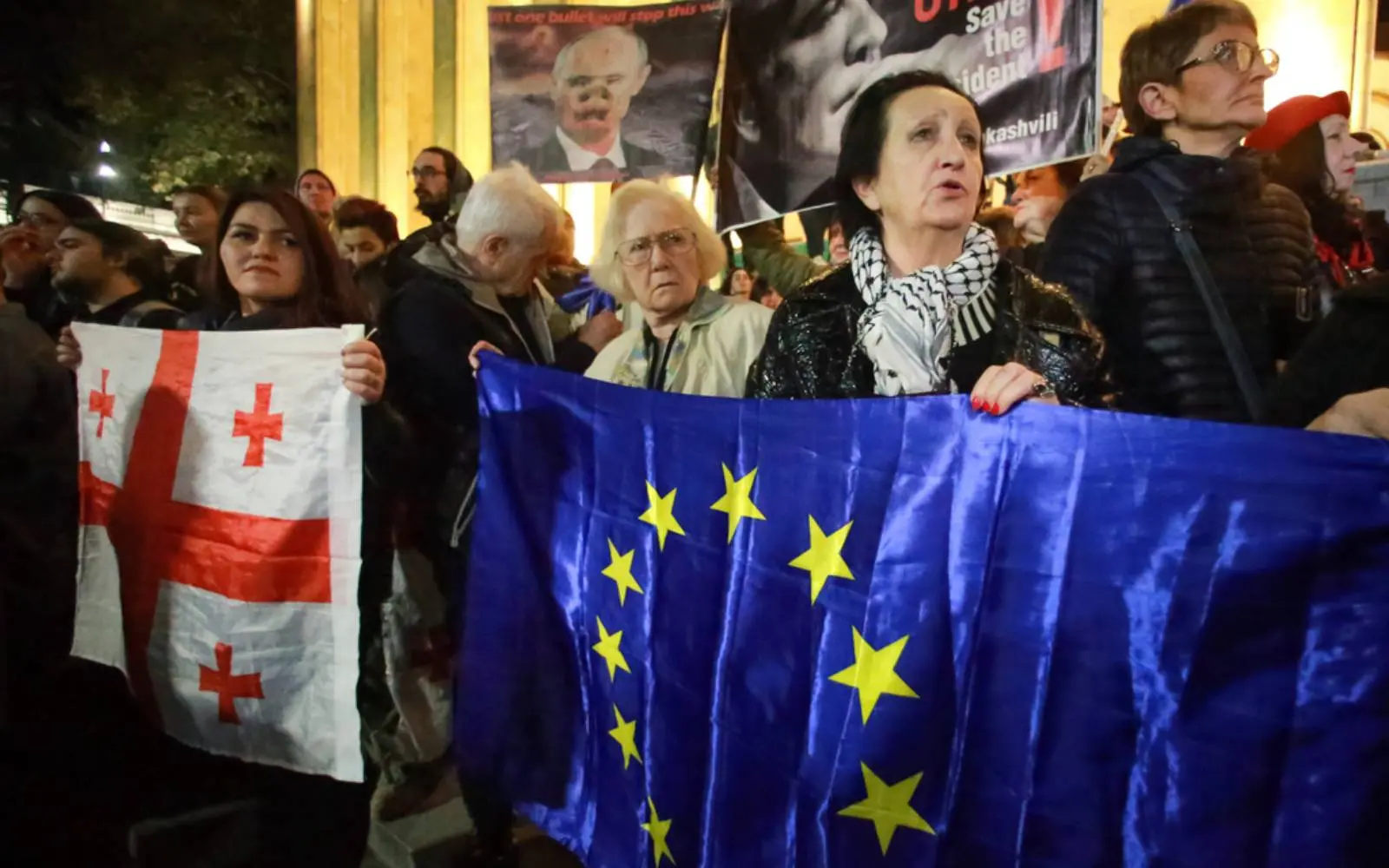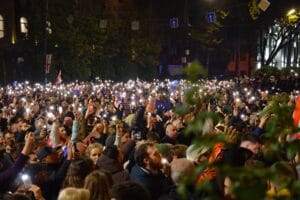Photo: protests against the results of the Parliamentary Elections – FMT
On Saturday, October 26, voters in Georgia went to the polls in a highly decisive parliamentary election that was regarded as a choice between the West and Russia. The Election Administration of Georgia (CEC) has declared the ruling Georgian Dream Party (GD) the victor with 54% of the votes. However, the opposition parties have refused to acknowledge the results, given that there have been many reports of election fraud and foul play by the increasingly authoritarian GD.
Background
GD, which is considered to be predominantly pro-Russian, has presented themselves as the party of peace, while accusing the opposition parties of wanting to provoke a new war with Russia. At the same time, they have implemented increasingly authoritarian measures, such as the infamous foreign agents law and a ban on LGBTQ+ ‘propaganda’ on schools, both modelled on laws that have been implemented in Russia in he past. Moreover, the founder of GD, Bidzina Ivanishvili has repeatedly declared that his party will ban the entire opposition if they attain a majority in Parliament.
Among other things, this behavior has severely diminished Georgia’s chances of becoming a member of the EU any time soon. Moreover, GD has refused to implement sanctions on Russia for their aggression in Ukraine, because that would only escalate the conflict according to them.
The opposition parties ran this election with a pro-European agenda in support of a quick ascension process and against the influence of Russia and the rule of GD. For this reason, the election was regarded as a choice between a pro-Russian or a pro-European future for Georgia.
For more background information you can consult our website.
The results
On Saturday, both GD and the opposition parties declared to have won the election based on different polls. According to the exit poll of Imedi TV, a pro-GD media channel, GD won the election with 56% of the votes, while the combined opposition would not reach more than 44%. Mtavari TV polled that the opposition would win the election with 48% of the votes, while GD would only attain 42%. Edison Research projected that 52% of the votes would go to the opposition, while only 41% would go to GD. In earlier elections, Edison Research was fairly close to the eventual result in Georgian elections.
When the CEC published the official results, where GD attained 54% of the votes, both the president of Georgia, Salome Zourabichvili, and all the opposition parties disputed these results and accused GD of voter fraud and interference. This is consistent with reports of election observers who witnessed many instances of voting irregularities. The prime minister of Georgia, a member of GD, declared, however, that these irregularities are just normal for a democracy and seen in many instances across Europe.
Voting irregularities
The Organization for Security and Co-operation in Europe (OSCE) led an election observation mission to Georgia and reported many irregularities. According to them, 6% of the election observers, a “significantly high number,” assessed their observation negatively due to voter interference and intimidation. Moreover, they found instances of party representatives, mainly from GD, filming the voting process and voters being followed after casting their vote. These are exemplary for the voter intimidation that took place throughout the country.
The International Society for Fair Elections and Democracy (ISFED) was also present as an election observer and found similar irregularities. They report instances of “mass ballot stuffing,” where votes that have not been cast by anyone are submitted, and instances of people who could vote multiple times. They reported irregularities at 91% of the polling stations they visited.
My Vote, an election observation mission of Georgian civil society organizations, also reported many irregularities and a deliberate scheme to influence of election. According to them, the lack of action against voter fraud of the authorities clearly showed that perpetrators were promised impunity and demonstrated the involvement of the ruling party.
Moreover, for the Georgian diaspora, who primarily supports the opposition, it is very difficult to vote due to a lack of polling stations. In total, there are only 67 polling stations outside of Georgia, for a Georgian diaspora which is estimated to total around 1 million citizens. This is also regarded as a measure by GD to diminish votes in favour of the opposition.
Consequences
After the election, the European Commission has declared that they are very concerned about the reported irregularities and that they call upon the CEC to investigate the irregularities. It also reiterated that democratic reforms are needed in order for Georgia to qualify for EU-membership. At the same time, Viktor Orbán, the prime minister of Hungary, already congratulated GD for their victory before the voting had officially ended and is visiting Georgia on Monday as a declaration of support for GD.
It is clear that the pro-Russian camp is ready to put their entire support behind GD, but it remains unclear whether the EU will do the same for the opposition. Of course, it is not clear yet to what extent the election has been meddled with and whether the opposition did really win, but hopefully independent investigation can give an answer to this. Waiting for the CEC for answers, however, will not yield any results, given that the CEC has been accused of being partial to the ruling party. Only an independent investigation could take away any doubts about the results and many thus await a final report by the OSCE ODIHR.
Going forward
Last week, during the presidential election in Moldova, there was a lot of clear interference from Russia (read our report here). Now, in Georgia, a pro-Russian party has won, or at least claimed to win, the parliamentary elections while the reports of voter interference are still increasing. Moreover, the fact that Orbán rushes to congratulate his allies in Georgia, means that autocratic structures in Europe feel comfortable to act and support their allies quickly, whether they won the election or not.
The opposition appears unified in their bid to prove the elections were fraudulent and that these should not be recognised. The support of international partners in this struggle is of importance. Meanwhile, Zourabichvili, Georgia’s president, has called upon Georgians to take to the streets on Monday in protest against the results of the election and the reported irregularities. These protests are currently ongoing and are expected to see massive mobilisation in the streets of Tbilisi. Georgia will see political unstable times in the upcoming months.
You can watch our preview of these elections with Sopo Shubitidze, Secretary General at Mtsvaneebi and Konstantin Eristavi, chairman at the Georgian Progressive Forum here.
Written by Guido Boven



